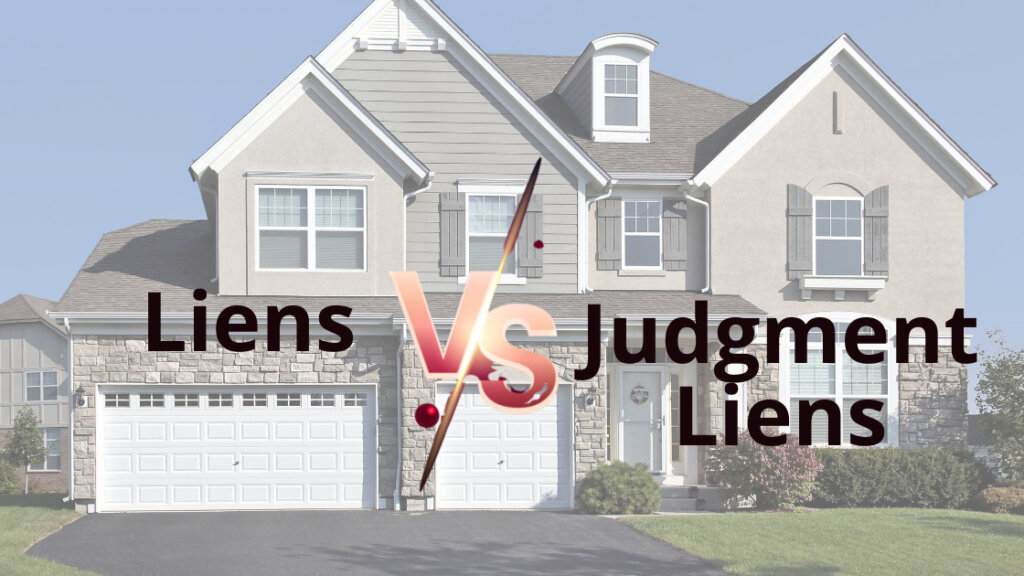
Is a judgment lien on your real estate causing you sleepless nights? Don’t worry, we’ve got you covered. In this blog, we will walk you through the process of clearing a judgment lien on your property so that you can regain control and peace of mind.
First, we’ll start with understanding the concept of a lien and what exactly a judgment lien, a type of lien, is. Then, we’ll dive into how a judgment lien sticks to your real property and explore the key differences between a general lien and a judgment lien.
Next, we’ll guide you on how to discover if there is a lien on your property and provide step-by-step instructions on how to clear a judgment lien. We’ll also discuss the potential consequences of having a judgment lien on your property, including the satisfaction of judgment, and explore various legal remedies available, such as filing for bankruptcy or utilizing lien avoidance.
Throughout the blog, we’ll emphasize the importance of hiring a real estate lawyer to navigate this complex process effectively. So, if you’re dealing with a judgment lien on your real estate, keep reading for valuable insights and expert advice.
Understanding the Concept of a Lien

A lien is a legal claim or right that a creditor holds over a debtor’s property as security for a debt or obligation. In terms of real estate, a judgment lien is a type of lien that is placed on a property by a creditor who has obtained a court judgment against the property owner. This means that if the property owner fails to pay the debt, the creditor has the right to foreclose on the property and enforce the judgment. Clearing a judgment lien on real estate involves a process of satisfying the debt through negotiation, settlement, or legal remedies such as lien avoidance. It is important to consult the recorder’s office for accurate information and guidance on dealing with judgment liens.
Understanding the concept of a lien is crucial for property owners. A judgment lien can have significant implications for the owner, affecting the ability to sell or refinance the property. It creates a cloud on the property’s title, which can raise concerns for potential buyers or lenders. To clear a judgment lien, property owners may consider negotiating with the judgment creditor, seeking legal advice, or even filing for bankruptcy to discharge the debt. By understanding the options available and taking appropriate action, property owners can strive to regain a clear title and protect their real estate investments.
Judgment Lien: What is it?
A judgment lien is a legal encumbrance placed on a debtor’s property by a creditor who has successfully sued them. This lien ensures that the creditor can recover the debt from the proceeds if the property is sold. To remove a judgment lien, the debtor must either pay off the debt or negotiate with the creditor for its removal.
How a Judgment Lien Sticks to Your Real Property

Understanding the mechanics of how a judgment lien exemption sticks to your real property is essential when you find yourself facing legal claims against your assets. A judgment lien emerges when a creditor initiates a lawsuit against a debtor, resulting in a court judgment in the creditor’s favor. Once this happens, the judgment lien attaches itself to the debtor’s real property, such as land or a house. Essentially, the creditor acquires a legal claim on the property, allowing them to seize the proceeds if the debtor attempts to sell or refinance the property.
Securing a judgment lien involves the creditor filing a document with the county recorder’s office, thereby creating a public record of the lien. These records can be unearthed through a thorough title search, enabling interested parties to learn about any encumbrances on the property, including types of property. As a result, the judgment lien can significantly impede the property owner’s ability to sell or refinance the property, as it clouds the title and raises concerns for potential buyers or lenders.
Clearing a judgment lien on real estate necessitates proactive measures such as negotiation with the creditor to satisfy the debt or exploring alternative legal remedies like bankruptcy or lien avoidance. Given the complexities involved, it is highly advisable to seek expert guidance from a competent real estate lawyer specializing in judgment liens. By comprehending how a judgment lien sticks to your real property, you can take the appropriate steps to clear the borrower lien and regain a clear title.
Lien vs. Judgment Lien

Understanding the Distinction Between a Lien and a Judgment Lien
When it comes to property ownership and debt security, it is crucial to comprehend the difference between a lien and a judgment lien. While a traditional lien serves as security for a debt, a judgment lien arises from a court-ordered judgment in favor of a creditor. By understanding the nature of these two types of claims, property owners can protect their rights and address any potential issues that may arise. This understanding includes being aware of the processes involved in obtaining a judgment lien, the implications it may have on property transactions, and the necessary steps to clear a judgment lien on real estate. To navigate this complex process successfully, property owners can seek assistance from an attorney or a title company knowledgeable in lien resolution and removal. The presence of coercion in obtaining a judgment lien should be carefully considered to ensure fair and legal practices are followed.
Discovering if a Lien is on Your Property
To determine the presence of a lien on your property, begin by conducting a comprehensive title search in your county recorder’s office. This thorough investigation will reveal any existing liens, including those recorded at the county recorder’s office, that may be attached to your property. Another avenue to pursue is direct communication with the lien holder. By reaching out to them, you can inquire about any outstanding obligations or debts associated with your property. It is essential to gain a clear understanding of the details surrounding the lien and engage in negotiations with the creditor to resolve the situation amicably.
If the lien has been satisfied, you have the right to request the lien holder to file a release of lien with the county recorder’s office. By doing so, you can ensure that the public records reflect the lien’s resolution and your clear title is duly acknowledged. Conversely, if you believe that the lien was mistakenly filed, it is crucial to collect pertinent evidence to support your case. With this evidence, you may choose to challenge the lien in court to rectify any potential errors, including the abstract of judgment.
Navigating complex or disputed lien situations can be overwhelming, which is why seeking the guidance and representation of a qualified real estate attorney is highly recommended. They have the expertise to provide invaluable advice, helping you make informed decisions throughout the process.
Steps on How to Clear a Judgment Line on Real Estate
To clear a judgment lien on real estate, property owners must understand the crucial steps involved.
- Review the judgment thoroughly and verify its accuracy.
- If the grounds are legitimate, consider filing a motion to vacate or set aside the judgment.
- Negotiate with the judgment creditor to reach a payment agreement or settlement.
- If required, file for bankruptcy to clear the judgment lien.
- Work closely with a real estate attorney throughout the process to meet all legal requirements.
- Seek professional advice tailored to unique circumstances, including the treatment of the judgment lien.
The Consequences of a Judgment Lien on Your Property

The consequences of having a judgment lien on your property can be significant. It can make it challenging to sell or refinance your real estate, as potential buyers or lenders may be hesitant to get involved with a property that has a judgment lien attached to it. This can limit your options and hinder your ability to access the equity in your property. To clear a judgment lien, you will need to negotiate with the judgment creditor or file a motion to vacate or set aside the judgment if there are legitimate grounds. In some cases, filing for bankruptcy may be necessary. Working with a real estate attorney who specializes in judgment liens can provide the guidance and expertise needed to navigate the legal process and ensure all necessary steps are taken to clear the lien from your property.
Removing a Lien: What Are Your Options?
To remove a lien on real estate, options include paying off the debt, negotiating a settlement or payment plan, filing a motion in court, or waiting for the statute of limitations to expire. Each option has its considerations and requirements. Consulting with a legal professional is advised.
Legal Remedies Available: Filing for Bankruptcy and Lien Avoidance
Legal remedies, such as bankruptcy filing and lien avoidance, offer individuals the opportunity to clear a judgment lien on real estate effectively. These options provide the means to remove the encumbrance on their property and restore their control. Filing for bankruptcy is a comprehensive solution, offering relief for individuals burdened with overwhelming debt. Through bankruptcy, one can attain a discharge of the judgment lien, thereby eliminating the financial encumbrance. Alternatively, lien avoidance involves initiating legal proceedings to challenge the lien’s validity or priority, seeking its removal through court intervention. Engaging the services of a bankruptcy attorney becomes crucial to navigate the intricate legal process associated with these remedies. By leveraging these legal avenues, individuals can reclaim their financial stability and safeguard their real estate investments.
Hiring a Real Estate Lawyer: Why and When?
It is highly recommended to hire a real estate lawyer when facing complex legal matters concerning the property. Their expertise can guide you through the legal process, especially when buying or selling property, dealing with foreclosure, or resolving disputes. A real estate lawyer will protect your interests and ensure all legal obligations are fulfilled.
Final Reminders While Dealing with Judgment Liens
When dealing with judgment liens, it is crucial to remember a few key points. Familiarize yourself with the process of clearing a judgment lien on real estate. Seek the advice and assistance of a knowledgeable real estate attorney to navigate the legal procedures. Collect all relevant documentation and evidence to support your case effectively. Engage in negotiations with the judgment creditor to explore settlement or payment arrangements. Initiate the filing of necessary legal documents to eliminate the lien from your property’s title. Additionally, closely monitor the progress of lien removal and follow up when necessary for a successful resolution.
The Bottom Line
In conclusion, removing a judgment lien from your real estate can be a complex and overwhelming process. However, it is crucial to take the necessary steps to clear the lien and protect your property. Here are the key points to remember:
1. Understand the nature of a lien and how a creditor obtains a judgment against your property.
2. Explore legal remedies such as filing for bankruptcy or seeking a court order for lien removal.
3. Work with a skilled real estate attorney who can provide expert advice and assistance throughout the process.
4. Review the judgment carefully and verify its accuracy. If there are legitimate grounds, consider filing a motion to vacate or set aside the judgment.
5. Negotiate with the judgment creditor to reach a payment agreement or a settlement that satisfies the debt.
6. Be aware of the specific requirements and procedures in your county’s recorder’s office for removing a lien.
7. Consider selling the property to satisfy the lien, with the proceeds of the sale going towards clearing the debt.
8. Know your rights and options as a debtor, including the possibility of proving the debt has been paid or that the lien was obtained through illegal means.
9. Keep in mind that each case is unique, so seek professional advice tailored to your specific circumstances.
10. Stay proactive and act swiftly to address the lien, as time is of the essence.
Remember, while the process may seem daunting, with the guidance of a qualified real estate attorney and a thorough understanding of your rights and options, you can navigate the path toward removing the judgment lien from your property successfully.

